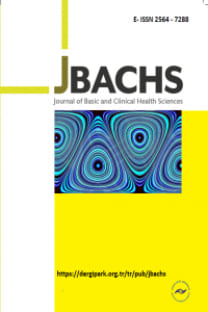AKCİĞER KANSERLİ HASTALARIN VE SAĞLIK BAKIM ÇALIŞANLARININ TABURCULUK EĞİTİMİNDEKİ ÖNCELİKLERİ: TANIMLAYICI BİR ÇALIŞMA
Amaç: Bu çalışma, kemoterapi sonrası akciğer kanseri hastalarının, hemşirelerinin ve doktorlarının taburculuk eğitim önceliklerini kart sort tekniği ile belirlemek amacıyla yapılmıştır.
Yöntemler: Çalışmanın örneklemini Kemoterapi Kliniğinde akciğer kanseri hastalar (n = 60) ile bu hastalara bakım veren hemşireler (n = 25) ve doktorlar (n = 25) oluşturdu. Veriler sosyodemografik bilgi formu ve taburculuk eğitimi ile ilgili konularda önem sırasına göre sıralanması gereken on kart kullanılarak toplanmıştır. Veri analizi için frekans, yüzde, aritmetik ortalama, ki-kare ve Fisher kesin testleri kullanıldı.
Bulgular: Analizler sonucunda hastaların yaş ortalamasının 61,91±7,27, doktorların yaş ortalamasının 27,56±1,78 ve hemşirelerin yaş ortalamasının 36±6,52 olduğu saptanmıştır. Doktorların, hemşirelerin ve hastaların arasında öğrenme konularına verilen öncelik sıralamasında birçok yönden farklılıklar olduğu saptanmıştır. Ayrıca hastaların cinsiyetlerine göre öğrenme konularını ilk sıraya yerleştirme durumları arasında anlamlı bir farklılık saptanmazken, kanserin evresine göre anlamlı derecede farklılık gösterdiği belirlenmiştir.
Sonuç: Bu sonuçlara göre, doktorlar ve hemşireler, eğitimden önce kart sıralama tekniğini kullanarak hastaların birincil öğrenme ihtiyaçlarını belirlemelidir. Bu şekilde, her hastanın / akrabanın hastalığın tedavisinde aktif rol alması ve eğitimin daha etkili olması sağlanabilir.
Anahtar Kelimeler:
Hasta eğitimi, Doktorlar, Hemşireler
THE PRIORITIES OF DISCHARGE TRAINING ACCORDING TO LUNG CANCER PATIENTS AND HEALTH CARE WORKERS: A DESCRIPTIVE STUDY
Objective: This study was carried out to determine the discharge training priorities of lung cancer patients, their nurses and doctors after chemotherapy using the card-sorting technique.
Methods: The study sample consisted of patients with lung cancer (n = 60) who received care in the Chemotherapy Clinic and nurses (n = 25) and doctors (n = 25) who give care to these patients. The data were collected using the sociodemographic information form and ten cards with discharge training related subjects who were asked to be ranked in order of importance. Frequency, percentage, arithmetic average, chi-square and Fisher's exact tests were used for data analysis.
Results: As a result of the analyzes, it was determined that the average age of the patients was 61.91 ± 7.27, the average age of the doctors was 27.56 ± 1.78, and the average age of the nurses was 36 ± 6.52. It has been determined that there are differences between the doctors, nurses and patients in their ranking of the priority given to learning subjects in many aspects. In addition, while there was no significant difference between the patients' positioning the learning subjects according to their gender, it was determined that there was a significant difference according to the stage of cancer.
Conclusion: According to these results, doctors and nurses should determine the primary learning needs of patients by using card sorting technique prior to training. In this way, it can be ensured that each patient / relative takes an active role in the management of the disease and that the education is more effective.
Keywords:
Patient education, Doctors, Nurses,
___
- 1. Gurses N. Pulmonary rehabilitation in a patient with lung cancer. Thoracic Surgery Bulletin 2014;6:77-82.
- 2. Piredda M, Rocci L, Gualandi R, Petitti T, Vincenzi B, Marinis MG. Survey on learning needs and preferred sources of information to meet these needs in Italian oncology patients receiving chemotherapy. European Journal of Oncology Nursing 2008;12:120–6.
- 3. Yıldırım M, Bayraktar N. The role of nurses working in surgical clinics in discharge planning and the influencing factors. Turkey Clinics J Nurs Sci 2010;2(2):73-81.
- 4. Avsar G, Kasıkcı M. Evaluation of patient education provided by clinical nurses in Turkey. Int J Nurs Pract 2011;17(1):67-71.
- 5. Rutten L, Arora N, Bakos A, Aziz N, Rowland J. Information needs and sources of information among cancer patients: a systematic review of research (1980-2003). Patient education and Counselling 2005; 57:250-261.
- 6. Suhonen R, Nenoren H, Lauktan A, Valimaki M. Patients’ informational needs and information received do not correspond in hospital. J Clin Nurs 2005;14:1167-1176.
- 7. Tasdemir N, Guloglu S, Turan Y, Cataltepe T, Ozbayır T. Learning needs of neurosurgery patients. J. Neurol. Sci 2010;27(4):414-20.
- 8. Pieper B, Sieggreen M, Freeland B, et al., Discharge information needs of patients after surgery. J Wound Ostomy Continence Nurs 2006;33(3):281-290.
- 9. Kaur K, Sharma SK, Jhajj H, Kau G, Bajwa H. Knowledge and learning needs of hypertensive patients visiting O.P.D. at D.M.C Ludhiana. Nursing and Midwifery Research Journal 2007;3(1):43-48.
- 10. Sendir M, Buyukyılmaz F, Musovi D. Patients' discharge ınformation needs after total hip and knee arthroplasty: a quasi-qualitative pilot study. Rehabil Nurs. (2013;38 (5):264–271.
- Yayın Aralığı: Yılda 3 Sayı
- Başlangıç: 2016
- Yayıncı: DOKUZ EYLÜL ÜNİVERSİTESİ
Sayıdaki Diğer Makaleler
Fatma YİLMAZ CAN, Mehlika PANPALLI ATEŞ
Burcu Eser, Sermet Sezigen, Tughan Duran, Osman Karakus, Tuncer Degim, Canan Uluoglu
Serkan Bakirhan, Mehmet Ozkeskin, Sevnaz Sahin, Fatih Ozden
Nadir görülen bir olgu: nonrekürren laringeal sinir
Mehmet ULUŞAHİN, Kadir TOMAS, Mithat Kerim ARSLAN
Nil Tekin, Merve Aliye Akyol, Burcu Akpinar Soylemez, Ozlem Kucukguclu, Ahmet Turan Isik
Gulser Kilinc, Mujdet Cetin, Umran Ergun Ertunc, Zafer Berk Kose, Alp Abidin Atesci
BIBLIOMETRIC ANALYSIS OF THE 100 MOST CITED ARTICLES ON COVID-19 IN THE INTENSIVE CARE FIELD
Gamze Sanlav, Yasemin Basbinar, Mehmet Emin Arayici, Seda Yilmaz, Hamiyet Hekimci Ozdemir, Hulya Ellidokuz
